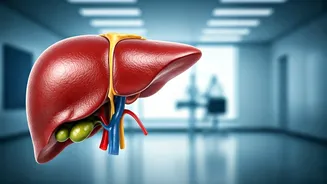Understanding Liver's Role
The liver, an unsung hero of the human body, performs hundreds of essential functions, including filtering toxins, producing bile for digestion, and storing
energy. It is responsible for breaking down substances, processing nutrients from the food we eat, and creating vital proteins for blood clotting. Additionally, the liver plays a critical role in metabolizing drugs and medications. It's a complex organ, working tirelessly behind the scenes to keep the body running smoothly. Any damage to the liver can disrupt these functions, leading to various health issues. Recognizing the importance of liver function highlights the need to adopt liver-friendly habits and practices to ensure the organ’s continued health and functionality. This proactive approach supports overall well-being and reduces the likelihood of future health complications related to liver disease or dysfunction.
Diet and Liver
Diet plays a pivotal role in liver health. Consuming a balanced diet rich in fruits, vegetables, and whole grains provides essential nutrients and antioxidants that protect the liver from damage. Limiting the intake of processed foods, saturated fats, and excessive sugar is crucial. These dietary elements are often linked to liver inflammation and the development of fatty liver disease. Moreover, incorporating liver-friendly foods such as leafy greens, berries, and garlic can provide additional benefits. Hydration is also paramount; drinking adequate water supports liver function. A diet rich in fiber helps in the detoxification process, aiding the liver. This dietary focus promotes healthy liver function and reduces the risk of liver disease. Making conscious food choices is a cornerstone of protecting and maintaining this vital organ.
Exercise and Activity
Regular physical activity is another critical aspect of supporting liver health. Exercise helps to maintain a healthy weight and reduces the risk of non-alcoholic fatty liver disease (NAFLD), a condition closely associated with obesity and metabolic syndrome. Engaging in moderate-intensity exercise, such as brisk walking, jogging, or cycling, for at least 150 minutes per week, can improve liver function and overall health. Exercise helps to improve insulin sensitivity, which is vital for preventing the build-up of fat in the liver. It also aids in reducing inflammation throughout the body, providing additional protection for the liver. Incorporating strength training exercises is another strategy to help maintain muscle mass, which further supports metabolic health. A consistent exercise routine, combined with a balanced diet, is a powerful combination for maintaining a healthy liver.
Alcohol and Liver
Alcohol consumption is a significant factor in liver health. Excessive alcohol intake is a leading cause of liver damage, including alcoholic fatty liver disease, alcoholic hepatitis, and cirrhosis. The liver has a limited capacity to process alcohol. When this capacity is exceeded, it leads to inflammation and damage of liver cells. Moderate alcohol consumption is generally defined as up to one drink per day for women and up to two drinks per day for men. However, some individuals should avoid alcohol altogether, particularly those with existing liver conditions. Limiting alcohol consumption or abstaining from alcohol protects the liver from unnecessary stress and damage. Awareness of personal tolerance levels and making informed decisions about alcohol intake are critical steps in preserving liver health. For individuals at risk, seeking professional medical advice regarding alcohol consumption is advisable.
Weight Management and Liver
Maintaining a healthy weight is vital for liver health. Obesity and being overweight increase the risk of developing NAFLD, which can progress to more severe liver conditions. Losing even a small percentage of body weight can significantly improve liver health by reducing fat accumulation and inflammation. A comprehensive approach to weight management includes dietary changes, regular exercise, and behavioral modifications. A balanced diet focused on portion control, whole foods, and limiting processed foods is key. Regular physical activity, including both aerobic and strength training exercises, helps burn calories and improve metabolism. Additionally, strategies like mindful eating and stress management can support sustainable weight loss. Consistent efforts in weight management not only benefit liver health but also improve overall well-being, reducing the risk of numerous other health complications. Consulting with healthcare professionals for personalized guidance is recommended.
Other Lifestyle Factors
Beyond diet, exercise, and alcohol consumption, several other lifestyle factors influence liver health. Avoiding exposure to toxins, such as those found in certain medications, environmental pollutants, and some supplements, is crucial. If medications are necessary, following healthcare professional’s guidance regarding dosage and duration is essential. Practicing safe sex and avoiding intravenous drug use reduces the risk of contracting hepatitis B and C, which can cause severe liver damage. Regular health check-ups, including liver function tests, enable early detection of any potential issues. Vaccination against hepatitis A and B is another preventative measure. Adopting a holistic approach to lifestyle, considering these various factors, promotes long-term liver health and reduces the risk of liver cancer and other liver-related diseases. Implementing these habits supports the optimal functioning of this essential organ.












